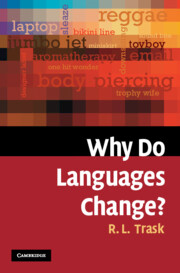Book contents
- Frontmatter
- Contents
- List of figures and tables
- A few words before we start
- Acknowledgements
- 1 How do languages change?
- 2 Why are languages always changing?
- 3 Where do words come from?
- 4 Skunk-Leek – my kind of town: what's in a name?
- 5 Where does English come from?
- 6 Why is American English different from British English?
- 7 Why is English spelling so eccentric?
- 8 Which is the oldest language?
- Some final thoughts
- Further reading
- Index
5 - Where does English come from?
Published online by Cambridge University Press: 05 June 2012
- Frontmatter
- Contents
- List of figures and tables
- A few words before we start
- Acknowledgements
- 1 How do languages change?
- 2 Why are languages always changing?
- 3 Where do words come from?
- 4 Skunk-Leek – my kind of town: what's in a name?
- 5 Where does English come from?
- 6 Why is American English different from British English?
- 7 Why is English spelling so eccentric?
- 8 Which is the oldest language?
- Some final thoughts
- Further reading
- Index
Summary
English today and yesterday
Today English is the mother tongue of hundreds of millions of people. It is also spoken as an everyday second language by many millions more, and it is by far the language most learned as a foreign language. In almost every global domain, English is the language of first choice for dealings between people. When an Egyptian plane flies into Moscow airport, the pilot talks to the air-traffic controllers in English. When a Swede negotiates a deal in Thailand, the negotiations are conducted in English. When Brazilian biochemists publish their latest research, they publish it in English. When a public statement is issued by the Secretary General of the United Nations, or by the President of the International Olympic Committee, or by the Secretary General of NATO, that statement is almost always issued in the first instance in English.
English is the first language of the Internet, of popular music, of almost every branch of science, of maritime navigation. Indeed it would be difficult to think of a context where English is not used, even by non-native speakers. In the nineteenth century, the language of diplomacy and of fine arts was French: today it is English. In the nineteenth century, the language of such scientific and scholarly fields as chemistry and linguistics was German: today it is English. English has taken over the world on a scale never before seen.
- Type
- Chapter
- Information
- Why Do Languages Change? , pp. 84 - 105Publisher: Cambridge University PressPrint publication year: 2009



